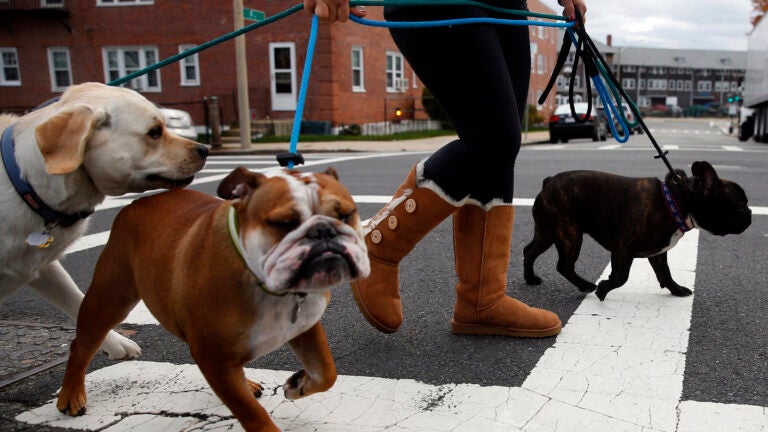A surge in animal adoptions is leading to a vet shortage and spike in emergency visits.

With people spending more time at home, animal adoptions surged during the pandemic. Now, veterinary clinics are feeling the impact of all those new pets, reporting longer wait times and a spike in emergency visits.
Dr. Kiko Bracker, director of emergency and critical care at the MSPCA’s Angell Animal Medical Center in Boston, told Boston.com the clinic is seeing a significant increase in requests for appointments, with weeks and months long bookout times, and longer waits for emergency walk-in services.
He believes these impacts are partly due to less experienced pet owners and partly to the increase in pets, especially younger animals.
“The new pet owner is going to view their animal differently, they don’t have the experience to say, ‘it’s ok I’m going to let this ride,’ where after a year or two of pet ownership, you get to know what’s not a big deal and what is,” Bracker said. “Younger animals are going to have more problems than adults, you see that in people and you see that in dogs and cats, too. Whether it’s you’re needing vaccinations or heartworm vaccinations, or getting in harm’s way…once they get a little bit older some of those juvenile types of problems get straightened out.”
The MSPCA reported a 40 percent increase in emergency visits at the Angell Animal Medical center, and predicted 10,000 new cases this year, WBZ reported. Unfortunately, there really isn’t a solution, Bracker said.
“There are not great, short-term, real solutions to this; I think longer wait times are going to be with us for a while,” he said. “Some of the likely solutions are long-term: creating more vets is going to take four to eight years to materialize.”
The American Veterinary Medical Association is working on this issue, and trying to create different positions like the veterinary equivalent of a nurse practitioner that can prescribe medications, Bracker said, but change like that takes time.
“In the near term, we’re left with unsatisfactory methods of making this better,” he said. “On the client level, it’s informing them, trying to give them the knowledge through other methods…things like online resources, poison control numbers, advice from your veterinarian who might know you better than the emergency service.”
In the end, he said, there’s no easy button to push to accommodate all the new animals, but he assured pet owners that all vets want to make good veterinary care possible.
“We’re getting more efficient, there are new veterinary urgent care and emergency facilities opening up to try to accommodate this, and it’s a bit of a slow road,” he said. “I will say all veterinary practices are committed to solving the problem of making animals better in a satisfactory way for owners. Nobody wants to close down and say we don’t have time…that’s why this is such an uncomfortable position for us, because that’s just not in our nature, we want to help and make things better.”
MSPCA spokesman Rob Halpin told Boston.com that MSPCA placed 2,634 animals in homes in the last year, nearly 1,000 more than the 1,734 that were adopted in 2020.
“Adoptions continue to be way up,” he said. “The pandemic and stay-at-home orders sparked a surge for adoptable animals that has continued to this day and shows no sign of abating.”
Thankfully, Halpin said MSPCA’s adoption centers in Boston, Methuen, and Centerville are not experiencing any surge in surrenders, and the MSPCA does not anticipate one.
Newsletter Signup
Stay up to date on all the latest news from Boston.com
"wait" - Google News
July 13, 2021 at 10:22AM
https://ift.tt/2T6pcKN
Here’s why wait times are so long at the vet clinic - Boston.com
"wait" - Google News
https://ift.tt/35qAU4J
https://ift.tt/2Ssyayj
Bagikan Berita Ini














0 Response to "Here’s why wait times are so long at the vet clinic - Boston.com"
Post a Comment